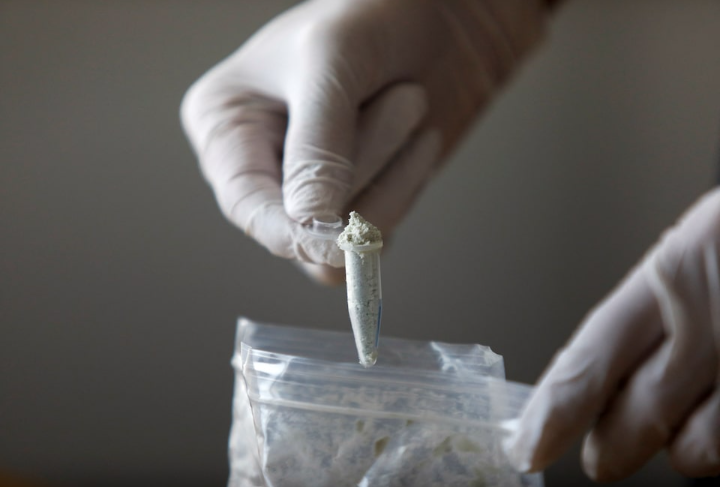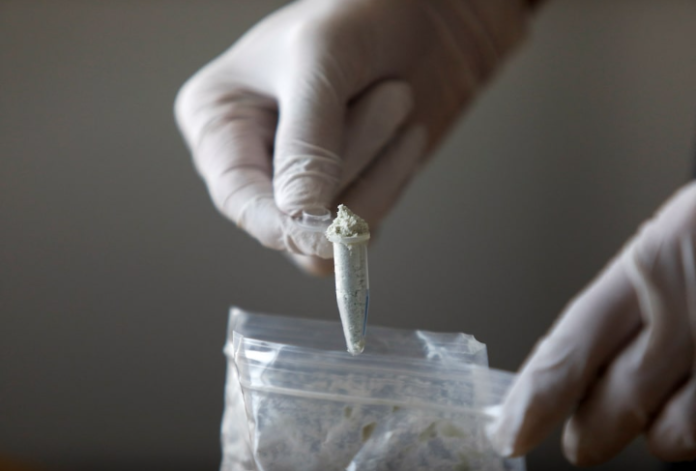In a move that has raised significant concerns, President Donald Trump’s recent suspension of foreign aid has led to the temporary cessation of U.S.-funded anti-narcotics programs in Mexico. These initiatives, managed by the U.S. State Department’s Bureau of International Narcotics and Law Enforcement (INL), have been instrumental in combating the influx of fentanyl into the United States.
The INL’s operations in Mexico are currently on hold due to the funding freeze, as reported by multiple informed sources. These programs are pivotal in disrupting the fentanyl supply chain, providing training to Mexican authorities to identify and dismantle clandestine fentanyl laboratories, and preventing the entry of precursor chemicals essential for the drug’s production.
A notable component of the INL’s support includes the provision of drug-detecting canines. According to a March 2024 INL report, these specially trained dogs have assisted Mexican officials in seizing millions of fentanyl pills in 2023 alone.
Dafna H. Rand, who served as the director of the Office of Foreign Assistance at the State Department from 2021 to 2023, emphasized the gravity of the situation: “By pausing this assistance, the United States undercuts its own ability to manage a crisis affecting millions of Americans. U.S. foreign assistance programs in Mexico are countering the fentanyl supply chain by training local security services and ensuring maximum U.S.-Mexican cooperation in the fight against this deadly drug.”
The State Department, along with Mexico’s presidency and foreign ministry, has not provided comments regarding the freeze.
Over the past decade, synthetic opioid overdoses have claimed the lives of more than 450,000 Americans, with millions more grappling with addiction. A Reuters investigation last year delved deep into the fentanyl supply chain, uncovering how traffickers import Chinese-manufactured fentanyl ingredients into the U.S. and Mexico, subsequently synthesizing them in hidden Mexican laboratories.
Through its projects, the INL collaborates with various Mexican entities on the front lines of the counternarcotics battle, including the military, prosecutors, and police forces. Beyond drug-related issues, the INL also extends support to address illegal migration and human smuggling.
The halt in foreign aid stems from an executive order signed by President Trump on January 20, which mandates a 90-day suspension of all U.S. foreign assistance programs pending reviews to determine their alignment with his policy goals. This directive has led to the suspension of numerous projects worldwide, encompassing much of the INL’s global initiatives. While U.S. Secretary of State Marco Rubio has granted waivers for certain “life-saving humanitarian assistance,” many programs remain in limbo, with ongoing confusion about which activities are permitted.
An individual familiar with the situation indicated that the administration is contemplating a waiver to allow funding for select foreign anti-narcotics programs, though it’s uncertain if the INL’s Mexico projects will be included. Two other sources confirmed that, as of now, the INL’s Mexico initiatives have not received exemptions.
During his campaign, President Trump pledged to tackle the fentanyl crisis, criticizing previous administrations for their perceived leniency in addressing the trafficking of synthetic opioids and their precursor chemicals. However, fentanyl-related deaths have continued to rise during his tenure.

The President has also threatened to impose 25% tariffs on Mexico if the country fails to curb the flow of fentanyl into the U.S. and manage illegal immigration. Additionally, he has directed the State Department to designate certain cartels as foreign terrorist organizations, a move that could expand the scope and resources of U.S. authorities in targeting organized crime groups in Mexico. The administration has yet to specify which cartels will receive this designation.
Since President Trump assumed office, both the U.S. and Mexico have increased military presence along their shared border to combat drug smuggling and illegal migration.
The combination of the terrorist designation and the suspension of foreign assistance has prompted concerns among U.S. officials and security analysts. There is apprehension that the administration is shifting from a collaborative bilateral approach with Mexico to a more unilateral strategy in addressing drug-related issues and cartel activities.
During his campaign, President Trump advocated for a “military operation” against Mexican cartels and affirmed that U.S. strikes on these organized crime groups were “absolutely” under consideration. Recently, the top U.S. general overseeing North American troops announced an increase in airborne surveillance of Mexican drug cartels to gather intelligence and determine effective countermeasures.



